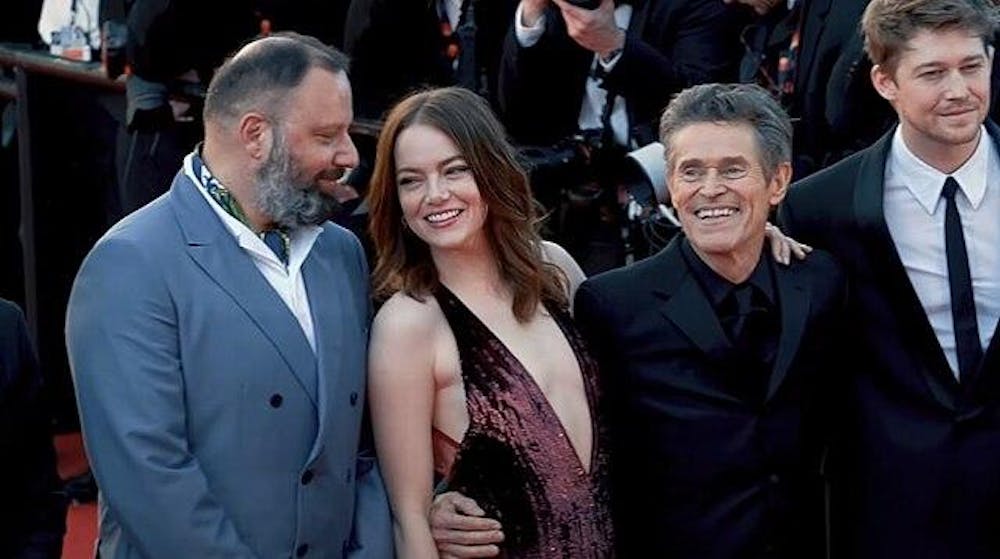Based on the 1992 novel by Alasdair Gray, Yorgos Lanthimos’ newest film “Poor Things” is a thoughtful exploration of freedom, autonomy and liberation. The subversive filmmaking, lively acting performances and detailed craft help bring the film to life.
“Poor Things” follows Bella Baxter — played by Emma Stone — a Frankensteinian creature created by Dr. Godwin Baxter, played by Willem Dafoe. Bella has the body of an adult but the brain of an infant. Godwin’s assistant Max McCandles, played by Ramy Youssef, plans to marry Bella, but the conniving Duncan Wedderburn, played by Mark Ruffalo, runs off with her and attempts to show her the world.
The craft of the film is undeniably dazzling. The production design transforms cities like Lisbon and Paris into surreal yet inviting sets, with meticulous attention to detail. Moreover, the skies are often abnormally colored, adding to the odd and surreal atmosphere of the film. The film’s score — composed by Jerskin Fendrix — is sometimes whimsical, sometimes haunting and sometimes both, yet it always fits with the film’s tone.
Throughout “Poor Things,” Lanthimos employs unconventional camera angles, wide lenses and uneasy zooms. Much like Bella experiencing the unpredictability of the real world for the first time, the viewer is kept on edge by the unpredictable nature of the cinematography. The film even switches from black and white to color as Bella’s understanding of the world deepens.
Emma Stone delivers a standout performance, perfectly capturing the development of her character. At the beginning of the film, Bella has the mental capacity of an infant — she speaks in short phrases, throws tantrums and haphazardly breaks plates. As the film progresses, so does Bella, and Stone manages to convey Bella’s growth and progression in subtle and effective ways, like the incremental improvement of her speech or the more proper body language.
Much of the film’s humor comes from Stone’s performance, as Bella’s behavior is uninhibited by knowledge of what is polite and what is taboo. For example, she speaks freely to strangers about sex, and she spits out her food when she does not enjoy it. Ruffalo, too, delivers a humorous performance, as his character struggles with his desire to be with Bella and his disgust at her inappropriate behavior.
The film is deeply interested in freedom and autonomy. Specifically, Bella’s autonomy over her own body becomes a focal point of the story. Duncan — who, for most of the film, is seen having sex with Bella, drinking and gambling — wants to keep her away from other men. Max — who is engaged to Bella — believes she should return to him and marry him. Godwin — who created Bella — also feels a sense of paternal ownership over her. Even Alfie Blessington, played by Christopher Abbott, barges into the film much later and claims that Bella is his wife.
Yet, Bella does not concede to any of the men’s claims over her body. She realizes her body is her own possession, and she can do whatever she wants with it. She decides to work at a brothel in Paris, deeply dismaying the proprietorial Duncan. Since Bella has only recently entered the world, she has minimal knowledge of how society might view or treat a woman’s body. Thus, she realizes she can do whatever she wants, which causes distress to the numerous men who want to control her.
Bella — through experiencing the real world for the first time — also learns about the beauty and pitfalls of being human. While walking through the streets of Lisbon, she becomes entranced with someone performing music, but her delight is interrupted by fights breaking out near her.
In Alexandria, she is so devastated after witnessing poverty that she takes all of Duncan’s money and gives it to the poor. In Paris, she becomes curious about ways to improve the world. Her investment in the progression of the world parallels her own cognitive progression as a human. The film demonstrates that, without the preconceived notions that humans have been conditioned to believe through society, it is human nature to seek to help others.
With its impressive craft, “Poor Things” engrosses the viewer in its world and delivers an odd, funny and layered story about an empathetic woman who yearns for freedom.







